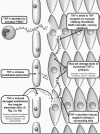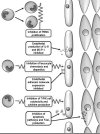Immunological mechanisms of pentoxifylline in chronic heart failure
- PMID: 19168508
- PMCID: PMC2639411
- DOI: 10.1093/eurjhf/hfn040
Immunological mechanisms of pentoxifylline in chronic heart failure
Abstract
The progressive syndrome of chronic heart failure (CHF) represents a common disease pathway that may be derived from a host of varying insults (including myocardial ischaemia and infarction, hypertension, viral infection, pregnancy, etc). Despite this multifarious aetiology, a common phenomena observed in CHF patients is elevated levels of tumour necrosis factor (TNF)-alpha. This has led to the widespread concept that TNF-alpha is directly involved in the pathophysiology of CHF and as such, attempts have been made to inhibit TNF-alpha production in this cohort. However, to date, there have been no clear beneficial effects from TNF-alpha inhibition and indeed trials of direct anti-TNF therapy have provoked worsening of clinical outcomes. Conversely, a possible exception is pentoxifylline (PTX), a putative TNF-alpha inhibitor with possible (but ill-defined) vasodilatory properties. Several small clinical trials assessing the use of PTX in CHF have suggested beneficial effects on multiple surrogate clinical markers. Interestingly, these trials failed to show a concordant effect on circulating TNF despite the clinical improvement, suggesting other key beneficial properties of this novel agent. This review article provides an insight into the potential beneficial mode of the action of PTX in CHF and calls for more investigation of this interesting agent.
Figures


Comment in
-
Inflammation in chronic heart failure: what is familiar, what is unfamiliar?Eur J Heart Fail. 2009 Feb;11(2):111-2. doi: 10.1093/eurjhf/hfn039. Eur J Heart Fail. 2009. PMID: 19168507 Free PMC article. No abstract available.
-
Immunological mechanisms of pentoxifylline in chronic heart failure.Eur J Heart Fail. 2009 Jul;11(7):728. doi: 10.1093/eurjhf/hfp067. Epub 2009 May 20. Eur J Heart Fail. 2009. PMID: 19457899 No abstract available.
References
-
- Muntwyler J, Abetel G, Gruner C, Follath F. One-year mortality among unselected outpatients with heart failure. Eur Heart J. 2002;23:1861–1866. - PubMed
-
- Levine B, Kalman J, Mayer L, Fillit HM, Packer M. Elevated circulating levels of tumor necrosis factor in severe chronic heart failure. N Engl J Med. 1990;323:236–241. - PubMed
-
- Rauchhaus M, Doehner W, Francis DP, Davos C, Kemp M, Liebenthal C, Niebauer J, Hooper J, Volk HD, Coats AJ, Anker SD. Plasma cytokine parameters and mortality in patients with chronic heart failure. Circulation. 2000;102:3060–3067. - PubMed
-
- Siwik DA, Chang DL, Colucci WS. Interleukin-1beta and tumor necrosis factor-alpha decrease collagen synthesis and increase matrix metalloproteinase activity in cardiac fibroblasts in vitro. Circ Res. 2000;86:1259–1265. - PubMed
-
- Torre-Amione G, Kapadia S, Lee J, Bies RD, Lebovitz R, Mann DL. Expression and functional significance of tumor necrosis factor receptors in human myocardium. Circulation. 1995;92:1487–1493. - PubMed
Publication types
MeSH terms
Substances
LinkOut - more resources
Full Text Sources
Medical

